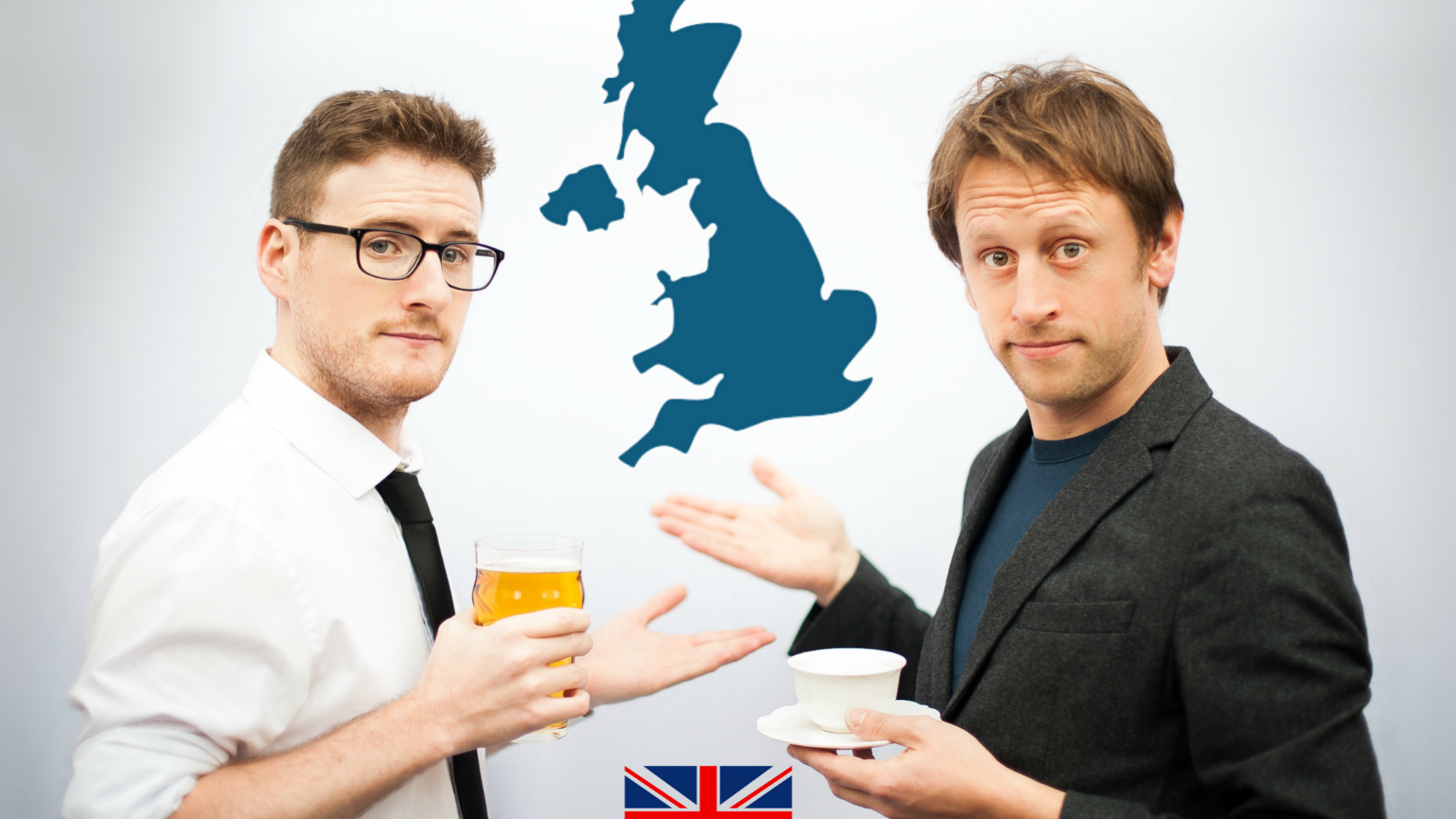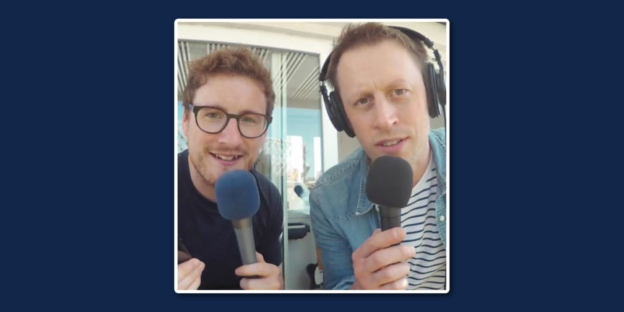Friend of the podcast Andy Johnson returns to give us some news and tell some stories all related to things that begin with the letter “M”. Intro & outtro transcripts available.
 [DOWNLOAD]
[DOWNLOAD]
Introduction Transcript
Hello! Hello! Welcome back to the podcast. I hope you’re doing well out there in podcast land.
I was thinking the other day… I’ve been working as an English teacher for nearly 17 years now. I often ask my students and have always asked them throughout my career, what they do in English outside class – like, what they read or watch or listen to, how they continue to work on their English when I’m not in front of them, and I’ve always been surprised at how people just don’t do enough listening… and I’ve always thought that if my learners – or learners of English in general, listened to more things in English, regularly – often just for enjoyment rather than as some kind of obligation, how this would make a big difference to their skills. A lot of my students, even the ones at B2 level or above (and I’m talking about all the students I’ve met – including ones from around the world when I was working in London – so not just my French students in Paris) A lot of them admit that they just hardly ever listen to English things outside class.
Yes, a lot of people say that they watch films and TV shows in English “with English subtitles”, but I don’t often hear people telling me that just listen to things, like radio shows, online interviews and podcasts. Of course there are reasons why people don’t listen enough, although if you’re really serious about learning a language you’ll know that these reasons are just excuses really. But there are reasons – like people say they find it hard to find the time, or they don’t really understand how podcasts work, or because they don’t really know what to listen to. That’s one of the main things.
Even if there is a lot of content out there, people don’t quite know what to listen to, they might not know how to listen (from a technical side) and they just don’t take the initiative to do it. They don’t go out of their way to find audio content and make listening to it part of their lifestyle, which is a pity because it can make a massive difference to your oral English. How can anyone expect to be able to operate in English as a spoken language without investing time in just listening to the language on a regular basis.
Perhaps this is a symptom of learning English in a classroom – you sign up to the course, you pay your money and that’s it – the time you spend in class is the time you spend on putting English in your life. But we know, don’t we – everyone knows, that to get real progress you have to bring English into your life on a more regular basis, in a more personal way, long term, connecting with the language as often as possible, reading it, listening to it, using it in speaking and in writing – and dealing with the kind of English that people actually use – the living English, rather than just reading grammar rules, doing translations, doing pre-prepared exercises with no context and none of the real nitty gritty of language being used to communicate ideas between people, and that’s one of the reasons I started this podcast. I wanted learners of English to just listen to more English – and real conversations with language occurring spontaneously – all given within a sort of personal context – like you’re sitting down with some friends in a cafe or pub – almost like being there yourself – but done with learners of English in mind, not native speakers of English. So the idea has always been to encourage people to just listen to English, regularly – using content that’s designed for you, with you in mind.
So that’s one of the reasons why I do this podcast.
I could explain it in a complex way, talking about language acquisition or intake vs input, or other methods, theories and approaches to learning with audio – but to keep it simple, the principle is: just listening to English being spoken and doing it regularly, for longer periods of time can show real improvement as a consequence – in terms of how you notice language, how you absorb vocabulary and features of pronunciation, how the language can become like a sort of voice that runs through your head and how this can transfer into your speaking and pronunciation. It’s about connecting with the English language as a living force.
OK this is starting to sound like Star Wars now, so I’ll move on. I just wanted to give you encouragement here to keep listening and to remind you that there is method to the madness here. I’m a professional. I know what I’m doing and you can trust me, I’m an English teacher…
So let me tell you about what you can hear on the podcast today.
In this episode I’m talking to Andy Johnson who I expect you already know from previous episodes. If you don’t know Andy then it would be a good idea to check out his past appearances on the podcast. You can search the episode archive on the website for episodes with Andy.
Here’s a quick tip about searching the episode archive that some of you may already know, but that I’m sure others aren’t aware of.
If you want to search my episode archive (which you can find at teacherluke.co.uk/archive ) for a certain keywords, like “grammar” or “Andy” or “Amber” or “idioms” or something, here’s what you can do – and this will work on any website page on the internet.
On a Mac – press “command + f” then type the word you’re looking for in the little search bar that appears. Let’s say you search for “Andy”. Instances of “Andy” will be highlighted on your screen and you can switch between them using the arrows that will appear on your browser.
On a PC (not a Mac) it’s “ctrl + f” and then search…
All the times the word “Andy” is on that page will be highlighted, making it easy to find episodes with Andy.
Now, why is this episode called “The M Word”? Any idea?
What could that M stand for?
If you’ve heard previous episodes with Andy – we always seem to talk about roughly the same things every time! There are just certain themes that usually come up in my conversations with Andy. Do you know what they are? Coincidentally enough they all begin with the letter M.
So what has Andy mentioned before on this podcast, that starts with an M?
Have a listen, because Andy has a few stories to share with you, all of them relating in some way to the letter M.
So now, without any further ado, let’s get started with some more English listening practice.
London Marathon Fancy Dress
Michael Phelps vs Shark (1)
Michael Phelps vs Shark (2)
Ending Transcript
So that was Andy telling us a few stories.
I would just like to say at the end of this episode – thank you very much if you sent me a message recently to wish me a happy birthday. I received messages in my inbox, on FB, Twitter and in the comment section. That is very nice of you, thank you! If you didn’t realise it was my birthday and you’d like to wish me a happy birthday, you can write “Happy Belated Birthday!” which is what you write when you’re late.
Happy Belated Birthday!
Belated means “happening later than expected” or “later than when something was supposed to happen”
E.g.
A belated apology
A belated attempt to do something (when you try to do something but it’s too late, or later than it should have been). “He made a belated attempt to apologise but didn’t help”
Belated recognition (e.g. when an artist receives recognition for their work, but it’s too late – perhaps they’re dead by the time they get the recognition they deserve)
Also:
Overdue – for more work-related things like a report or payment that comes in too late. An overdue payment.
Anyway, thanks for the birthday wishes. I had a lovely day with my wife and daughter and received some very nice gifts.
So little time, so many things to talk about. I managed to get to the cinema to see Avengers: Infinity War. In a nutshell I was blown away by it. I don’t know how they managed to include so many characters with their own complex storylines into one single film and make it work. I really enjoyed it. It made me laugh, I enjoyed the character development of the bad guy – weirdly we kind of understand where he is coming from in terms of his motivations and I think that helped the plot, the performances of the actors, some of the weird moments, I liked the action sequences and I was quite stunned by the ending – I’m not giving away any spoilers, but let’s say it didn’t end in the way these kinds of action movies usually end and I can’t wait for the next part of the story to come out next year.
I also saw Deadpool 2 which made me laugh a lot, especially in the way it makes fun of the typical tropes of superhero action films. It’s very funny and extremely violent.
I’m yet to see the new Star Wars film. Yes, there is another new Star Wars film out. This one is called Solo and it’s a kind of origins story of Han Solo. I wasn’t expecting much from it because honestly, how can it be possible to make a film about such a beloved character as Han Solo without Harrison Ford that doesn’t disappoint everyone. It’s bound to be a disappointment because Han Solo can’t really be separated from Harrison Ford, but I haven’t seen it yet and actually the trailer looks pretty good. It looks like a smaller story – more like a gangster film or a heist film or something, but set in the Star Wars universe. I have the impression that the critics don’t like it, but I’ve been avoiding the reviews because I don’t want to spoil it. I’m going to see it when I can.
Anyway, that’s enough talking! Thank you for listening.
If you listen to my podcast on iTunes or you use the Apple Podcasts app you might see that you don’t have access to the back catalogue of episodes. You’ll see that some older episodes are missing.
If you want all those episodes, plus more bonus content – get the Luke’s English Podcast app. It’s available free for Apple and Android phones from the app store.
That’s it – speak to you again soon! BYE!








 So Jack, on my recent trip back to the UK I picked something up for you. I know you’re into cars, so let me hand you the keys to a 1975 Rolls Royce Silver Shadow. This is the ultimate in classic British luxury motoring, at the time it was released this was absolutely the top of the range in terms of comfort, style and quality and remains to this day a symbol of British class and sophistication. It doesn’t get better than this. With its massive V8 engine delivering 190BHP , steel frame, vacuum assisted brakes, power steering, manual 3 speed gearbox and top speed of 106mph this is a precision machine from the golden age of British motoring. Admittedly this 43 year old vehicle is no longer top of the range and can’t compete with modern day equivalents such as the high performance luxury models produced by Bentley, but for a leisurely drive through the British countryside in the most quintessentially British manner this has to be the number 1 choice. They don’t make them like this any more. The engine delivers a powerful, stately and commanding sense of control and the ride is so utterly smooth and poised that you can enjoy afternoon tea and cake with guests in the back without spilling a drop on the leather upholstery. It oozes charm, it breathes refinery, it is the epitome of retro British eccentricity. The Rolls Royce Silver Shadow.
So Jack, on my recent trip back to the UK I picked something up for you. I know you’re into cars, so let me hand you the keys to a 1975 Rolls Royce Silver Shadow. This is the ultimate in classic British luxury motoring, at the time it was released this was absolutely the top of the range in terms of comfort, style and quality and remains to this day a symbol of British class and sophistication. It doesn’t get better than this. With its massive V8 engine delivering 190BHP , steel frame, vacuum assisted brakes, power steering, manual 3 speed gearbox and top speed of 106mph this is a precision machine from the golden age of British motoring. Admittedly this 43 year old vehicle is no longer top of the range and can’t compete with modern day equivalents such as the high performance luxury models produced by Bentley, but for a leisurely drive through the British countryside in the most quintessentially British manner this has to be the number 1 choice. They don’t make them like this any more. The engine delivers a powerful, stately and commanding sense of control and the ride is so utterly smooth and poised that you can enjoy afternoon tea and cake with guests in the back without spilling a drop on the leather upholstery. It oozes charm, it breathes refinery, it is the epitome of retro British eccentricity. The Rolls Royce Silver Shadow.